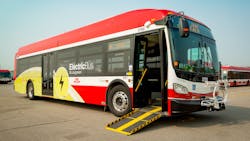TTC signs agreement with PowerON for zero-emission charging infrastructure
The Toronto Transit Commission (TTC) Board of Commissioners approved a 20-year agreement on Feb. 10 with PowerON, a subsidiary of Ontario Power Generation, that will see PowerON design, build, co-invest and operate the charging and related electrical infrastructure to support TTC’s electrification efforts.
PowerON notes this represents a “first-of-its-kind partnership between public agencies and corporations working together to deliver full-fleet electrification.”
"PowerON's partnership with the TTC, Canada's largest transit system, is a clear example of how OPG and its subsidiary companies are progressing innovative and effective climate change solutions," said OPG President and CEO Ken Hartwick. "As Ontario's largest power generator and clean technology innovator, OPG is well positioned to lead the drive for economy-wide decarbonization while balancing economic and environmental benefits and Ontario's electricity needs."
PowerON explains the province’s clean energy grid is more than 90 percent carbon-free and it recognizes applying its expertise to other sectors, such as transportation, is crucial to meeting climate change goals.
"Electrification is the future of public transit and I'm proud that the TTC continues to be an industry leader in this regard," said TTC Chair Jaye Robinson. "This new infrastructure is a critical step toward achieving the TTC and city of Toronto's goal to reach net zero emissions as soon as possible. The TTC Board wholeheartedly supports the organization's innovative plans and we look forward to working with PowerON to achieve a zero-emissions fleet by 2040."
TTC first introduced electric buses into service in 2019 and is pursuing its transition to a zero-emission fleet using an approach that involves three major manufacturers. TTC evaluated the differences between all three electric bus models, including the effect of how they charge on overall performance, through a head-to-head comparison to inform future procurements of battery-electric buses. The transit provider operates 60 battery-electric buses, the largest fleet in Canada and third largest in North America.
About the Author

Mischa Wanek-Libman
Group Editorial Director
Mischa Wanek-Libman is director of communications with Transdev North America. She has more than 20 years of experience working in the transportation industry covering construction projects, engineering challenges, transit and rail operations and best practices.
Wanek-Libman has held top editorial positions at freight rail and public transportation business-to-business publications including as editor-in-chief and editorial director of Mass Transit from 2018-2024. She has been recognized for editorial excellence through her individual work, as well as for collaborative content.
She is an active member of the American Public Transportation Association's Marketing and Communications Committee and served 14 years as a Board Observer on the National Railroad Construction and Maintenance Association (NRC) Board of Directors.
She is a graduate of Drake University in Des Moines, Iowa, where she earned a Bachelor of Arts degree in Journalism and Mass Communication.
